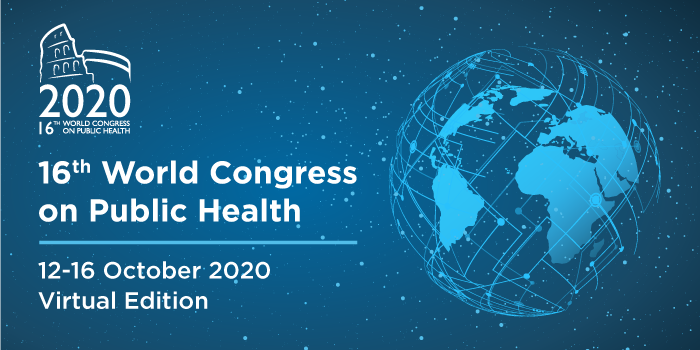 |
The European Public Health Association Newsletter - December 2020 |
1. EditorialWelcome to our December newsletter with updates from us, our members, and key partners, including the European Commission, ECDC and WHO. We hope the information is useful to further your work. This is the last newsletter of 2020, a difficult year for all of us. Let's hope next year the vaccine will work and COVID-19 will disappear. We would like to wish you all a happy festive season and a good start in 2021 and we look forward to working with you again in 2021. Wishing you pleasant reading, Iveta Nagyova, EUPHA President and Dineke Zeegers Paget, EUPHA Executive Director
|
2. EUPHA updateStructural, interpersonal, and individual factors influencing sexual orientation-based disparities in mental health : a socio-ecological perspective on sexual minority stigmaCongratulations to Arjan van der Star, EUPHA-SGMH section vice-president, for his Ph.D. thesis exploring how stigma-related factors shape the mental health of sexual minorities. https://openarchive.ki.se/xmlui/handle/1...Iveta Nagyova, EUPHA president, member of the Advisory Council on Innovation for Noncommunicable DiseasesIn response to the growing evidence that the combination of COVID-19 and noncommunicable diseases (NCDs) leads to more serious disease outcomes, including death, the WHO Regional Director for Europe has introduced an initiative to dramatically accelerate the response to NCDs and their risk factors across the WHO European Region. Together with high-level implementers, leading experts and clinical practitioners from governments, academia, think tanks, and civil society organizations, Iveta Nagyova will work to reshape the prevention and management of NCDs in the Region. https://www.euro.who.int/en/about-us/reg... Webinar: "Legal Epidemiology and the Path to Better Health Law and Policy"Registration is open for another session of the international webinar series on Public Health Ethics, Law and Human Rights for the Future of Humanity.
Attendance is free but registration is required. |

3. European Public Health WeekSAVE THE DATEEuropean Public Health Week: 3rd edition |
4. European Public Health Conference14th European Public Health Conference, 10 - 13 November 2021
Next year’s European Public Health (EPH) Conference will be held from 10 to 13 November 2021. We sincerely hope to host an in-person conference in Dublin, Ireland. But as we are still living in the midst of the corona pandemic, we are also looking into options of organizing a virtual or hybrid conference. We are sure of two things: the conference will take place and the time is right to discuss the lessons learned from the COVID-19 pandemic and to look at what is needed to build a strong (public) health sector in the post- COVID-19 era. Check our website for any updates. Abstract submission
16TH WORLD CONGRESS ON PUBLIC HEALTH - WCPH2020
WCPH2020 Accreditation WCPH2020 Abstract supplement: Free access until 31 December |
5. EUPHA members updateThe University of Liverpool becomes EUPHA's newest institutional memberWe are very happy to welcome the University of Liverpool as an institutional member of EUPHA. This University, with its long-lasting tradition and established reputation in public health research is a strong added value to our network. In particular, their Law and Non-Communicable Diseases unit will closely collaborate with EUPHA-LAW and EUPHA-CHR. We are looking forward to a new a productive and fruitful year. https://www.liverpool.ac.uk/law/research... |

6. European Journal of Public HealthVolume 30, Issue 6, December 2020Editorial https://academic.oup.com/eurpub/issue/30... |
7. Call for proposals, job opportunitiesSurvey by NOGThe German Network of Young Professionals in Public Health (NÖG) is conducting a brief survey of public health professionals in Europe as part of its research into public health workforce training programs in international public health systems. The survey seeks to familiarize researchers with national public health training infrastructure and best practices. By polling health system personnel, this survey is designed to inform targeted research and identify qualitative interview candidates. NÖG invites you to learn more and take part in the survey here: https://ec.europa.eu/eusurvey/runner/noeg-berufswege. Questionnaire on the impact of COVID-19 on health critical infrastructures in EuropeEUPHA is partner in the special interest group on Critical Health Infrastructure preparedness for future pandemics in Europe (CHI-PPE). The COVID-19 pandemic and its consequences may lead to new ways of working, but in the meantime, pandemics can lead to major disruptions in the procurement of basic resources and workforce requirements. This may have a negative impact on the health of the citizens and the economy in general. We are trying to unveil measures for the preparedness and resilience of critical health infrastructures in Europe. To this end, we are collecting insights to identify key challenges and preparedness strategies at the operational and procurement level, which can be highly diverse in times of high infection rates and high hospital admissions. We invite colleagues to fill the questionnaire here and to stay tuned! Open PhD positions at Bielefeld school of public health, GermanyThe new Leibniz-ScienceCampus „SOEP RegioHub“ is founded as a scientific cooperation between Bielefeld University and the Socio-economic Panel (SOEP, DIW) in Berlin. |
8. Interesting newsCould Slovakia's mass testing programme work in England?Martin McKee and Iveta Nagyova, EUPHA president, explain Slovakia's strategy regarding mass testing and explore the possibility of transfering it to England. https://blogs.bmj.com/bmj/2020/12/07/cou...Focus on primary prevention paves the way for a less unequal Europe in the new EU4Health programmeEuropean Public Health Alliance | 15 December 2020 Climate change and its impact on mental healthBriefing requested by the ENVI committee Public stakeholder meeting: development and authorisation of safe and effective COVID-19 vaccines in the EUEuropean Medicines Agency | 11 December 2020
A year of Covid-19 - and a year of extraordinary scienceWellcome | December 2020 An aging world requires more support for health systems'Development assistance that strengthens health systems so they are able to adapt to a diverse set of challenges is vital to ensuring that low- and middle-income countries are prepared for the health challenges facing both the young and the older populations.' https://www.thinkglobalhealth.org/articl...Climate action: the best gift for global healthWhen prevention failed, even the best functioning healthcare systems broke under the surge of covid-19 patients. While the rollout of vaccines will lessen the pandemic burden, climate change still threatens to disrupt our health systems further and erode decades of health gains. https://www.bmj.com/content/371/bmj.m472...Air pollution a cause in girl's death, coroner rules in landmark caseThe Guardian | 16 December 2020 |
9. Upcoming courses and conferences
|
10. Interesting publicationsThe Global Society on Migration, Ethnicity, Race and Health: why race can't be ignored even if it causes discomfortEuropean Journal of Public Health | Viewpoint | 04 December 2020 https://academic.oup.com/eurpub/advance-...Body dissatisfaction predicts the onset of depression among adolescent females and males: a prospective studyJournal of Epidemiology and Community Health | Original Research | 7 December 2020 Lifetime perspective on alcohol and brain healthThe BMJ | Editorial | 4 December 2020 The 2020 report of The Lancet Countdown on health and climate change: responding to converging crisesThe Lancet Countdown is an international collaboration established to provide an independent, global monitoring system dedicated to tracking the emerging health profile of the changing climate. The mental health impact of the COVID-19 pandemic on people with and without depressive, anxiety, or obsessive-compulsive disorders: a longitudinal study of three Dutch case-control cohortsThe Lancet Psychiatry | 8 December 2020 Fragmented health systems in COVID-19: rectifying the misalignment between global health security and universal health coverageThe Lancet | Health Policy | December 2020'This Health Policy paper compares three types of health systems (ie, with stronger investments in global health security, stronger investments in universal health coverage, and integrated investments in global health security and universal health coverage) in their response to the ongoing COVID-19 pandemic and synthesises four essential recommendations (ie, integration, financing, resilience, and equity) to reimagine governance, policies, and investments for better health towards a more sustainable future.' https://www.thelancet.com/journals/lance...What COVID-19 may teach us about interdisciplinarityThe BMJ Global Health | Commentary | 15 December 2020 Making sense of the evidence in population health intervention research: building a dry stone wallThe BMJ Global Health | Analysis | 09 December 2020 |
11. European Commission newsThe organisation of resilient health and social care following the COVID-19 pandemicOpinion of the Expert Panel on effective ways of investing in health (EXPH) Coronavirus: Commission presents "Staying safe from COVID-19 during winter" strategyThe Commission adopted a strategy for sustainably managing the pandemic over the coming winter months, a period that can bring a risk of increased transmission of the virus owing to specific circumstances such as indoor gatherings. The strategy focuses on physical distancing and limiting social contacts, testing and contact tracing, safe travels, healthcare caapcity and personnel, pandemic fatigue and mental health, and national vaccination strategies. https://ec.europa.eu/commission/presscor...Coronavirus response: Commission welcomes agreement on crucial VAT relief for vaccines and testing kitsOn 7 December, the European Commission welcomed the adoption of important new measures which will enable Member States to relieve EU hospitals, medical practitioners and individuals of Value-Added Tax (VAT) when acquiring coronavirus vaccines and testing kits. https://ec.europa.eu/taxation_customs/ag...Coronavirus: Commission concludes exploratory talks with Novavax to secure a new potential vaccineToday [17 December 2020], the European Commission concluded exploratory talks with the pharmaceutical company Novavax with a view to purchasing its potential vaccine against COVID-19. The envisaged contract with Novavax would provide for the possibility for all EU Member States to purchase 100 million doses, and they could further purchase up to 100 million more doses. https://ec.europa.eu/commission/presscor...Speech by Commissioner Kyriakides to the European Public Health Alliance General Assembly 2020In this speech at the European Public Health Alliance (EPHA) Assembly, Commissioner Stella Kyriakides underlines the fundamental role of the civil society in the legislative process and addresses the call of the citizens for more Europe in the area of health. https://ec.europa.eu/commission/commissi...Speech by President von der Leyen at the EU Health Summit'The message is clear: Vaccination is about self-protection and solidarity.' https://ec.europa.eu/commission/presscor...Commission welcomes political agreement on EU4HealthEU4Health is the fourth and largest of the EU Health Programmes since their inception in 2003, with a dedicated budget of €5.1 billion allocated to it under the agreement by the European Parliament and Council on the next multiannual financial framework. [...] EU4Health will make a significant contribution to the post-COVID-19 recovery by making the EU population healthier, strengthening the resilience of health systems, and promoting innovation in the health sector. https://ec.europa.eu/commission/presscor...Vaccine roll-out to begin, thanks to the EU Strategy for COVID-19 vaccinesSandra Gallina, Director General of the European Commission’s Directorate General for Health and Food Safety, talks about the imminent roll-out of COVID-19 vaccines. The EU Strategy on this front ‘is an example of what working together can achieve and an indication of what a strong European Health Union will be able to deliver’, Gallina says. https://ec.europa.eu/newsroom/sante/item...AMR: Commission publishes its progress report on the EU's Action PlanToday [15 December 2020], the European Commission published its 5th progress report on the implementation of the European One Health Action Plan against Antimicrobial Resistance, which was adopted in June 2017. https://ec.europa.eu/newsroom/sante/news...Team Europe contributes €500 million to COVAX initiative to provide one billion COVID-19 vaccine doses for low and middle income countriesFair and equitable access to a successful COVID-19 vaccine, regardless of income, for millions of people across Africa, Asia, the Caribbean and Pacific, and in Europe's eastern and southern neighbourhood, has been enabled by €500 million of new European financial support for the global vaccine initiative COVAX. Team Europe's engagement will accelerate global efforts to bring the pandemic under control and scale up distribution of a successful vaccine as soon as it becomes available. https://ec.europa.eu/commission/presscor...Commission publishes Expert Group report on methods to assess health systems resilienceToday [18 December 2020], the Commission published a report by the EU Expert Group on Health Systems Performance Assessment (HSPA) titled "Assessing the resilience of health systems in Europe: an overview of the theory, current practice and strategies for improvement”. https://ec.europa.eu/newsroom/sante/news... |
12. European Centre for Disease Prevention and Control newsEurosurveillance - Volume 25, Issue 48, 03 December 2020Rapid communication Eurosurveillance - Volume 25, Issue 49, 10 December 2020 Editorial Community use of face masks and similar barriers to prevent respiratory illness such as COVID-19: a rapid scoping review Eurosurveillance - Volume 25, Issue 50, 17 December 2020Rapid communication |
13. WHO newsTurning the tide: Slovenia's success story of fighting cervical cancerSlovenia has come a long way to become one of the most successful countries in the WHO European Region in the fight against cervical cancer. From having had one of the worst statistics in Europe on cervical cancer incidence, Slovenia has managed to turn the tide thanks to political will, cooperation and a robust screening programme. https://www.euro.who.int/en/countries/sl...Apart Together surveyThe report draws on the perspectives of 30,000 respondents living in 170 countries and serves as a first inquiry into the social impact of the COVID https://www.who.int/publications/i/item/...New publication outlines practical steps for refugee and migrant health data collectionIn collaboration with Uppsala University, WHO/Europe has published new technical guidance that outlines why and how Member States should collect refugee and migrant-specific health data through their national health information systems (HIS). https://www.euro.who.int/en/health-topic...NCDs News Events Areas of work Data, publications and tools Country packages Contact us WHO/Europe forms NCD Advisory Council to inspire and reform prevention and managementIn response to the growing evidence that the combination of COVID-19 and noncommunicable diseases (NCDs) leads to more serious disease outcomes, including death, the WHO Regional Director for Europe has introduced an initiative to dramatically accelerate the response to NCDs and their risk factors across the WHO European Region. https://www.euro.who.int/en/health-topic...Cities of the WHO European Region unite to stop COVID-19 and build a better urban lifeMany cities in countries across the WHO European Region have become epicentres of the COVID-19 pandemic. In the wake of this unprecedented challenge, local authorities came together to analyse good practices and lessons learned in tackling COVID-19 outbreaks and to find ways to build back better – in the fastest way possible. https://www.euro.who.int/en/health-topic...New data from WHO/Europe shows links between gender and noncommunicable diseasesMen and women have different biological and behavioural risk factors for contracting noncommunicable diseases (NCDs), as shown by a new series of WHO reports released today. The reports analyse gender-specific data on NCDs from 8 different countries providing interesting insights on the links between gender and certain NCDs. https://www.euro.who.int/en/health-topic...What are countries doing to make their citizens more active? New country factsheets and reports show what worksWHO recently published new global ‘Guidelines on Physical Activity and Sedentary Behaviour’, an update to the first global guidelines established in 2010. Based on the most recent evidence for how physical activity can improve health, the guidelines are a fundamental tool for countries to develop incentives and programmes to make their citizens more active and healthier. https://www.euro.who.int/en/health-topic...Statement - Holiday season amid COVID-19 and a growing mental health crisis in EuropeStatement by Dr Hans Henri P. Kluge, WHO Regional Director for Europe. Behavioural considerations for acceptance and uptake of COVID-19 vaccines: WHO technical advisory group on behavioural insights and sciences for healthOn 15 October 2020, the WHO Technical Advisory Group (TAG) on Behavioural Insights and Sciences for Health held a special meeting with the WHO Department of Immunization, Vaccines and Biologicals to discuss behavioural considerations in relation to COVID-19 vaccine acceptance and uptake. The discussion focused on a series of key questions around achieving high and equitable uptake of vaccines through evidence-based and behaviourally informed strategies. |
|
This newsletter received co-funding under an operating grant from the European Union’s Health Programme (2014-2020). The content of this newsletter represents the views of the author(s) only and is his/her sole responsibility; it cannot be considered to reflect the views of the European Commission and/or the Consumers, Health, Agriculture and Food Executive Agency or any other body of the European Union. The European Commission and the Agency do not accept any responsibility for use that may be made of the information it contains. |
|
Unsubscribe If you would like unsubscribe from the EUPHA newsletter then please click here. |


